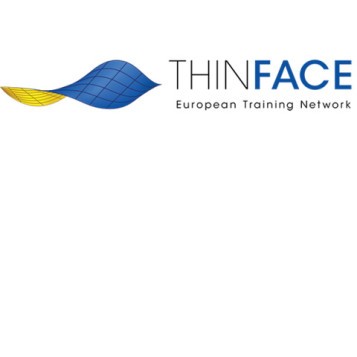THINFACE - Thin-film Hybrid Interfaces: a training initiative for the design of next-generation energy devices

THINFACE is an EU-funded project integrated by 5 university partners, 1 research organization, 2 industry partners, and 5 associated partners.

Organic thin-films constitute a fast growing area of electronic and opto-electronic devices that offer cost-effective and flexible solutions for e.g. improved energy efficiency and energy harvesting. Due to the achievements made during the past decade, the development of such sustainable energy devices has already reached an early commercialization stage; however, in order to further boost their uptake on the market, the improvement of device efficiency and lifetime is still needed. Such improvement requires a profound knowledge about fundamental properties of thin-film hybrid interfaces and their implementation in devices – a knowledge that is already requested from established and new companies focusing on organic electronic and opto-electronic devices. With this project, we establish a network that trains and educates young researchers within the area of hybrid thin-film interfaces for sustainable energy devices. In order to provide training and education that are of both high-quality and of relevance for the market, the research training programmes are in this consortium based on a combination of state-of-the-art research and industrial development and production processes.
The project is divided in five distinct workpackages that will investigate the thin-film formation, optimize interfaces and the lifetime and stability of the devices within different PhD projects. The researchers involved get training possibilities that meet the high standard of a Marie-Curie Initial-Training Network.
NanoGUNE runs the following two PhD projects:
- ESR03. Vapor phase doping and infiltration of conducting polymers
Exploit a vacuum based process (atomic layer deposition – ALD) for the top-down synthesis of conducting polymer-inorganic hybrids. Synthetic aspects as well as characterization of conductive polymers and their physical properties are investigated at Universita’ Degli Studi di Milano-Bicocca. Furthermore, Pirelli in Italy intends to investigate the effect of hybrid materials, based on the concept described above, in elastomeric model compounds. - ESR05: Lifetimes of HOMO and LUMO states of organic molecules relevant for Organic Photovoltaics (OPV) on different substrates
Calculations of the electronic ground-state properties of organic molecules relevant to OPV on metals and TiO2 are performed. Developed simulation tools and codes are applied to systems of technological interest at Universita’ Degli Studi di Milano-Bicocca. A stay at Danfoss, Denmark, will assist in getting experience on problems related to solar-cell production.
- Syddansk Universitet - Denmark
- Novaled AG- Germany
- Universita’ Degli Studi di Milano-Bicocca - Italy
- Technical University of Graz - Austria
- Université Pierre et Marie Curie - France
- Universidad Autonoma de Madrid - Spain
- CIC nanoGUNE - Spain
- NOVALED GMBH - Germany
- Technical University Dresden - Germany
- Abengoa Research - Spain
